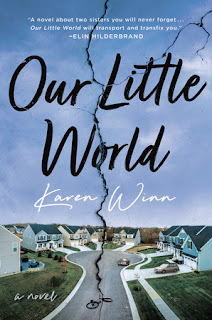 joined the Peace Corps after college. Bonnar taught ESL—English as a Second Language—at a community college for many years. She currently divides her time between tiny houses on a New Hampshire salt marsh and by the Sea of Abaco.
joined the Peace Corps after college. Bonnar taught ESL—English as a Second Language—at a community college for many years. She currently divides her time between tiny houses on a New Hampshire salt marsh and by the Sea of Abaco.
Spring applied the Page 69 Test to her new novel, Disappeared, and reported the following:
From page 69:Visit Bonnar Spring's website.defuse the situation, do whatever he thinks needs to be done. I’m working blindfolded here.”Page 69 in Disappeared is the half-page conclusion to Chapter 11. It’s the end of a phone call between Julie, the main character, and her brother-in-law’s secretary. Julie’s sister Fay had disappeared from their hotel room in Marrakech three days earlier.
“How can Mr. Ohana contact you?”
I leave my number, but considering my difficulties in getting a signal, I add, “If Gil can’t reach me, I’ll call back tonight.” Then I suggest that, if he wants to act quickly, he could contact Sam Monatti at the American Consulate in Casablanca. “Gil might have to light a fire underneath him to get him moving, but I’ll bet he’s better equipped to do that than I am.”
She gives me Gil’s cell phone number. “I’ll alert Mr. Ohana, but please call as soon as you find his wife.” The secretary finishes on a hiccup, and we both know she’s not saying— “or if you don’t find her.”
I walk down to the car again and start it with relief. Not all I hoped for, but it was easier not to have confronted Gil directly. Better to get his efficient secretary to relay the story minus my emotional baggage— like, what the hell have you gotten my sister mixed up in?
Snooping through Fay’s belongings and questioning the hotel staff has provided Julie with clues to her sister’s whereabouts—but no idea why she went there. When Julie narrowly eludes a knife-wielding attacker, she realizes she is in danger if she passively waits for her sister in town. She flees to Fay’s remote destination, only remembering in the last town she’ll pass to contact Fay’s husband, whom she blames for the trouble her sister is in. Her parting thought is what the hell have you gotten my sister mixed up in?
When Julie hangs up the phone, starts her car, and drives away, that’s the last communication she’ll have with the rest of the world. She’s on her own, heading into the Sahara Desert. While short on words, the action on page 69 of Disappeared is a watershed moment, marking the end of Julie’s quest for her sister in the modern world of telephones, restaurants, internet, and rental cars. And the beginning of the ordeal at the heart of Disappeared.
An intriguing instance of the Page 69 Test!
Q&A with Bonnar Spring.
--Marshal Zeringue























